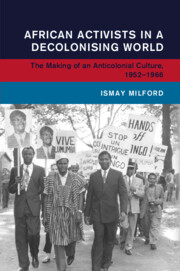‘An ambitious book, courageous and persuasive in advancing an argument derived from the very limitations encountered by its main protagonists. Far from crafting an alternative, transnational heroic narrative by lionizing these ‘secondary’ actors, often sidelined in nationalist histories, Milford uses their experiences and failures to offer us a better understanding of agency and thought in the shifting sands of imperial endgames. The book thus challenges us to grapple with the history of decolonization in microspatial ways and acknowledge the changing forms, frequent failures, and fractured globality of anticolonialism.’
Eric Burton
Source: H-Soz-Kult
'I approached this book with some trepidation, not because it didn’t look like a well-written, exceptionally well-researched text, but because I find anti-colonial nostalgia is the worst nostalgia there is … I didn’t have to worry. Ismay Milford gives us a very different book … There’s not another study like this book, of this period and the kinds of men who tried desperately to shape it. That’s a major contribution from any monograph.'
Luise White
Source: The Global Sixties
‘Milford’s exciting monograph underscores how thinking regionally can open up historical work on transnational anticolonialism in African contexts … 'African Activists' elucidates the importance of regional networks to transnational anticolonial efforts. The text represents a critical addition to literature on Africa’s global history and the Cold War and decolonization.’
Yasmina Martin
Source: H-Diplo Roundtable XXVI-14
‘In its richness and innovation, Milford’s book is a tour de force that challenges historians’ spatial understandings of African anticolonialism and decolonization, enriches scholars’ appreciation of the role of generation in the continent’s anticolonial politics, and offers a deep and diverse dive into the continent’s decolonization-era and postcolonial archives.’
Jeffrey Ahlman
Source: H-Diplo Roundtable XXVI-14
‘This book is a timely publication, not only for historical studies but also for discourses on the Cold War, politics, and global historical discourses. It takes the study of African history ahead of time by adopting current trends that consider local forces not as markers of disconnected historical dynamics but rather as constitutive parts of bigger global waves that influence one another in time and space. It is my hope that students and the general interested public will find book to be a necessary read and addition to their book shelves.’
Maxmillian Chuhila
Source: H-Diplo Roundtable XXVI-14



